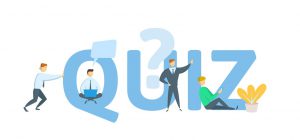US companies spend more than $160 billion every year on training. However, the effectiveness of this training is often questioned, and the retention of knowledge has long been of interest. Right back in 1885, Hermann Ebbinghaus proposed that 70% of learning is forgotten within 24 hours. After 30 days, it is expected that 90% of what has been learnt will be forgotten. How much an employee really gets out of training is therefore under scrutiny.
Of course, there are ways that you can improve learning retention, especially with employee training. Asking staff to take quizzes can be an effective solution.
So, here are some ways a quiz can help with staff training.
>> Create your online survey with Drag’n Survey, click here

1. Convince Staff They Need Training
Generally speaking, employees can be reluctant to take training. There are numerous reasons why this might be. This can include:
– They can’t see the relevance of the training.
– They fear losing control of their tasks by undertaking someone else’s methodology.
– They fear changes to their working processes that training may bring.
– Training can make employees feel undervalued.
– The employee thinks that they know everything about the subject/job/work and therefore, training is a waste of time.
All of these are valid concerns for leaders to understand and they need to address them in order for training to be successful. If staff aren’t onboard for training, then their retention rates will be lower and you are going to struggle.
One way to convince staff that they might need to refresh or to retrain is by using a quiz. By showing your staff the results of the quizzes you give them, you can therefore convince them that they need the training.
2. Quizzes Offer You A Way To Benchmark Learning
One of the best benefits for quizzes is that it allows you to benchmark their learning progress. If you just use one quiz, or none at all, you have no idea of their learning progress. By incorporating tests into your learning schedules you can see what training should take most priority and what information is being retained.
This can have several advantages as it allows you to focus your training efforts on the information that is harder for staff to learn. If you’re using e-learning software, where training can be customized for the employee, every staff member can be given specific training tailored for them. This prevents generalized training routines where some staff are bored and their time is wasted.
3. Passing A Quiz Can Reward Employees
If you want staff to take their training seriously, you have to ensure that you are giving them motivation for undertaking the training. Getting a certificate or specific announcement can be a great motivation for staff. But you can’t just give a certificate for turning up to training.
Employees can feel some pride and achievement if quizzes are incorporated. The quiz should be hard and really test their knowledge and there should be some form of mark for it. Those taking the assessment should be told how long the test is and how it is marked along with the criteria for passing.
You can make the test more valuable to your staff by offering different levels of award. For instance, there could be a pass mark, merit and distinction or you could offer a prize for the top result.
4. Collect Feedback On Your Training
While you might think your training is perfect and good for improving the quality of work, you staff might feel differently. By offering a quiz at the end of the training, you can collect information about how they perceived the training and whether or not they felt it was beneficial.
The information collected can then be fed back into the training team and used to improve training. Materials used in your organization for employee training should never be static. There are always going to be changes to technology, legislation and company processes. Staff might have insights in what you’ve taught that you’ve not thought about. For instance, they might know some shortcut keys in software or you’ve forgotten about new legislation that needs to be considered.
Creating this kind of feedback loop within your training allows you to be at the forefront of knowledge. Staff will also see training as being more relevant and worthwhile.
5. Quizzes Help To Retain Learning Objectives
Another key aspect of quizzes is that it helps to retain information learnt. Any assessment should be conducted often throughout learning but they shouldn’t be too long either. You should also ensure tests don’t include any answers that may seem inappropriate – this devalues your assessments.
You should not only ask your employees to take tests immediately after training but also offer tests 48 hours or a week after the training. Then you can really assess how much information has been retained and identify employees who might need to undertake refresher learning. It will also allow you to determine the quality of your training.
Conclusion
Quizzes can help staff with retention of new information and so they are beneficial for your training programs. There should small and frequent assessments throughout the training, so you can assess staff at different stages of learning to ensure they’re paying attention and remembering key points.
Sources :
– bizlibrary.com, click here
– flashcardlearner.com, click here
Read the french version
Comment améliorer la formation desemployés avec des quiz ?, click here